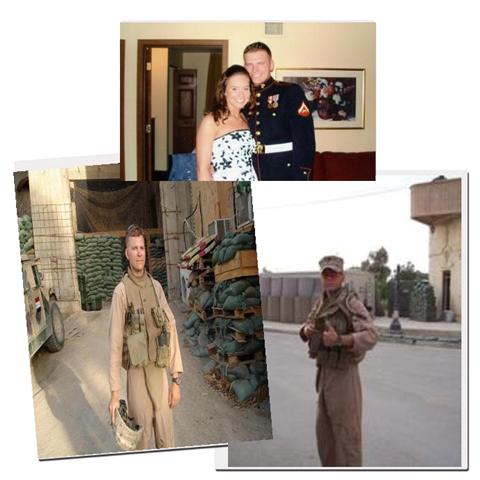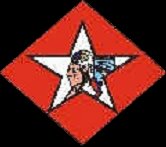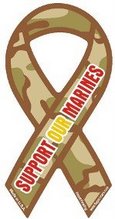I Marine Expeditionary Force
Marine Corps News
2007-04-23

AR RAMADI, Iraq (April 23, 2007) -- Observation Post Hawk is one of 1st Battalion, 6th Marine Regiment’s original posts, standing on the eastern most edge of the battalion’s area of responsibility in West Central Ramadi, Iraq.
The main focus of the Charlie Company manned OP was to provide security for and around the city’s main medical facility, the Ramadi General Hospital.
Working against a determined enemy, the Marines worked side-by-side with Iraqi Security Forces to return the city’s largest civilian care facility to its people.
ROUGH BEGINNINGS, FIGHTING FOR CONTROL
In the early stages of 1/6’s deployment, the Marines at OP Hawk were kept busy by an area containing an active insurgent presence.
The observation post would sometimes see several small-arms or mortar attacks per day, while Marines and Iraqi soldiers conducted operations to help stem the violence.
“We did a lot of patrols when we first got here to put boots out on the ground,” said Sgt. Jason E. Wing, 22-year-old sergeant of the guard at OP Hawk. “The area was still heavily contested.”
Insurgent attacks and activity in the area centered around the Ramadi General Hospital, a valuable component in the city’s infrastructure.
The Ramadi General Hospital is the area’s premiere medical facility, with a medical staff of more than 260 doctors and emergency care personnel.
The facility remained available to local citizens and the staff was cooperative with Coalition Forces, but insurgents maintained some level of freedom in the hospital as well.
Using intimidation tactics on the staff and residents, insurgents were able to utilize the facility when Marines and Iraqi forces were not in the area.
“The insurgents used to have some freedom in the hospital,” said 1st Lt. Aaron M. Zimmerman, 25-year-old platoon commander at OP Hawk. “They used to be able to bring their wounded into the hospital for care.”
To loosen the grip of the insurgency in the area, the Marines of OP Hawk, assisted by soldiers of the Iraqi Army’s 4th Company, 2nd Battalion, 1st Brigade, 7th Division, kept constant pressure on the insurgents with observation from fixed positions and regular patrols.
Over the following months, the combined strength of the Marines and Iraqi Army made insurgent movement difficult, opening a pathway for civil military operations in the hospital and local neighborhoods.
“Through our operations, we were able to push the insurgents back and open lines of communication with the people,” said Zimmerman, a native of Naples, Fla.
Recognizing the importance of the residents’ cooperation, the Marines of OP Hawk, assisted by a civil affairs team and their Iraqi Army counterparts, began a push to win over the locals with community aid projects.
While continuing to provide a significant security presence in the area, most notably building Iraqi Army guard posts at the hospital, the combined force provided fuel, food, generators, and much needed medical supplies to the hospital and surrounding community.
The continuous aid and support of the local families, combined with a decrease in insurgent activity, caused the majority of people in the area to increase their cooperation with Marine and Iraqi Security Forces.
“The insurgency cannot provide the things we can, so the people quickly realized that they are better off working with us,” said Zimmerman.
SUCCESS AND CONTRIBUTIONS
Now several months later in the deployment, a large measure of success can be seen in the area surrounding OP Hawk.
For the Marines now manning the post, success is easily measured by the number of attacks received recently.
“We’ve gone from having several attacks a day in the early stages to, now, not having a single attack in weeks,” said Wing, a native of Lewiston, Maine.
For the residents of the area and Iraqi soldiers securing the hospital, success is shown in their abilities to prevent the insurgents’ return.
“Insurgents can no longer come here discreetly for treatment because my soldiers are here to detain them,” said Maj. Jabbar, 42-year-old commanding officer of 4th Company. “Around here, insurgents cannot even move through the streets because the Iraqi Army and Marines are watching.”
Although the efforts of the Marines and Iraqi soldiers at OP Hawk were vital in beginning the process, much of the decline in insurgent activity can be attributed to the battalion’s strategy of installing joint security stations throughout West Central Ramadi.
Through this process, Marines, Iraqi soldiers and Iraqi police establish and operate numerous forward bases in key areas of the city.
These security stations provide an increased security presence and introduce Iraqi Security Forces to the people of the area, which has had a significant impact on insurgent activity.
“After (Joint Security Station) Qatana and OP North went up, it really made a big difference here,” said Zimmerman. “With the decrease in activity, we were able to work with the hospital staff daily.”
While the Marines and Iraqi soldiers at OP Hawk had always assisted the hospital when they could, the opportunity to work with the hospital every day made a significant difference.
“Talking to them every day, we’re able to get them what they actually need, not what we ‘think’ they need,” said Zimmerman.
With solid security in place and continued support from both Marines and Iraqi Security Forces, the local populace has repeatedly expressed their appreciation to the combined force.
“The people are happy because we keep the area under control,” said Jabbar. “They appreciate our efforts and what we’ve done here.”
A DIFFERENT ROLE
The nearly complete success in OP Hawk’s area of responsibility has led to a change in roles for the Marines operating there.
In the beginning, Marines led operations to give complete control of the hospital back to the residents and win over the local populace, but now, the Marines are just a helping hand.
“Our purpose here is to assist the Iraqi Army in maintaining control of the hospital and local neighborhoods,” said Wing. “We’ve gone from a proactive role in security to letting the Iraqi Security Forces take over.”
The Marines’ role in security has been pulled back to standing post at fixed positions and conducting civil military operations to aid the people, allowing Iraqi Security Forces to take the lead on security in the neighborhoods.
In recent months, the majority of boots on the streets are those of the Iraqi Army.
“It seems like the only ‘patrolling’ we do now is our visits to the hospital,” said Wing.
With their decreased security role, the Marines of OP Hawk will remain focused on assisting the staff of the Ramadi General Hospital and working alongside civil affairs Marines to improve the surrounding area.
Although many of the Marines attribute the area’s continued success to their Iraqi counterparts’ hard work, the soldiers of 4th Company say it couldn’t be done without them.
“The cooperation between the Marines and Iraqi soldiers has made Ramadi safer,” said Jabbar. “We could not accomplish as much as we have without the Marines.”

Major Jabbar, 42-year-old commanding officer of the 4th Company, 2nd Battalion, 1st Brigade, 7th Division, speaks with staff from the Ar Ramadi General Hospital during a patrol in West Central Ar Ramadi April 7, 2007.

Sergeant Jason E. Wing, 22-year-old sergeant of the guard for Company C, 1st Battalion, 6th Marine Regiment, plays a game of team ping pong with a soldier of the Iraqi Army as a teammate. Marines have worked alongside Iraqi soldiers to at Observation Post Hawk in Ar Ramadi, Iraq, to make the area safer for local residents.
The purpose and effect of Observation Post Hawk






No comments:
Post a Comment